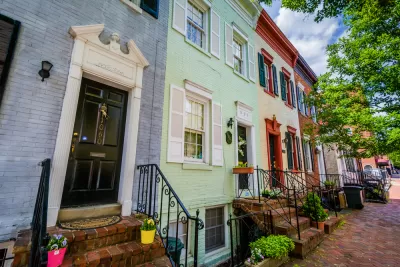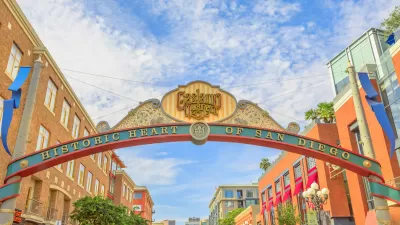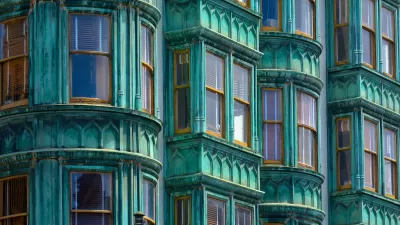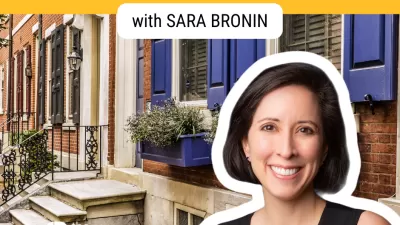A row over two Transformers statues in a D.C. neighborhood lays bare the "absurdities" inherent in historical preservation, one writer argues.

A pair of Transformers statues is causing a stir in Old Georgetown, reports Topher Matthews in the Georgetown Metropolitan. "The Old Georgetown Board indicated that they would reject the application of Newton Howard to keep the two gigantic Transformers sculptures he installed in front of his house on Prospect St. in January" in a move that, Matthews argues, lays bare the absurdities inherent in the historical preservation movement.
"The Citizens Association weighed in against the sculptures, and laid out the case against them: Prospect Street like many residential streets is characterized by attached houses built to the property line abutting public space. While planters are normally found in this zone, monumentally scaled sculptures are not. There is also no historic precedent for displaying sculptures on public space abutting the primary facade." But the homes in the neighborhood, Matthews reminds readers, "were all built in the middle of the 20th century with a faux 'federal' style to appear older than they really are." According to Matthews, "one good 'tell' that these homes were all built in the age of the automobile is that they all have garages, which is about as historic as a Transformer statue." In his opinion, "there’s really nothing there to be preserved."
Historical preservation, at its core, is meant to prevent the wanton destruction of historic buildings. "Actual destruction of historic buildings, like Penn Station in New York, was the original raison d’etre of historic preservation. The horror people felt at losing this irreplaceable structure is still felt to this day." The Transformers, on the other hand, are "just a couple tons of steel temporarily parked in front of a house on land that is technically publicly owned." In fact, Matthews goes on to say, "there’s something else made from a couple tons of steel that routine[ly] gets parked in front of this house on land technically publicly owned! How exactly are Toyota Corrollas consistent with the historic character of Prospect St.?" While cars are no more historically accurate than Transformers, "the irony is that if the Transformer sculptures were actual Transformers, then the homeowner could just change them into a yellow Beetle and a semi-truck and park them on the street, and nobody would even notice."
This isn't about preservation, Matthews argues. "It’s all about the preservation of a preferred aesthetic and the use of the state to enforce that preferred aesthetic." Focusing on aesthetics above all else, writes Matthews, "cheapens the reality of history." Preservation is meant to save historic buildings from demolition, yet the Transformers don't do any damage to the building they're installed in front of. "To leave them up would do not one iota of harm to the history of Georgetown, nor any of its extant buildings."
FULL STORY: Transformers Highlight the Absurdities at the Heart of Historical Preservation

Maui's Vacation Rental Debate Turns Ugly
Verbal attacks, misinformation campaigns and fistfights plague a high-stakes debate to convert thousands of vacation rentals into long-term housing.

Planetizen Federal Action Tracker
A weekly monitor of how Trump’s orders and actions are impacting planners and planning in America.

In Urban Planning, AI Prompting Could be the New Design Thinking
Creativity has long been key to great urban design. What if we see AI as our new creative partner?

King County Supportive Housing Program Offers Hope for Unhoused Residents
The county is taking a ‘Housing First’ approach that prioritizes getting people into housing, then offering wraparound supportive services.

Researchers Use AI to Get Clearer Picture of US Housing
Analysts are using artificial intelligence to supercharge their research by allowing them to comb through data faster. Though these AI tools can be error prone, they save time and housing researchers are optimistic about the future.

Making Shared Micromobility More Inclusive
Cities and shared mobility system operators can do more to include people with disabilities in planning and operations, per a new report.
Urban Design for Planners 1: Software Tools
This six-course series explores essential urban design concepts using open source software and equips planners with the tools they need to participate fully in the urban design process.
Planning for Universal Design
Learn the tools for implementing Universal Design in planning regulations.
planning NEXT
Appalachian Highlands Housing Partners
Mpact (founded as Rail~Volution)
City of Camden Redevelopment Agency
City of Astoria
City of Portland
City of Laramie





























